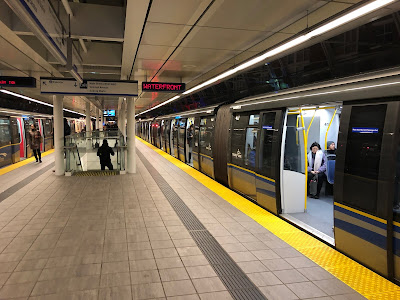The TransLink Mayors’ Council on Regional Transportation will be meeting this Thursday. One of the items on the agenda will be extending SkyTrain to UBC.
Today, we are in phase two of the three phase 10-Year Vision which includes expanding transit in Metro Vancouver. From a rail rapid transit perspective, this means that funding is available to build a SkyTrain extension from Commercial-Broadway Station to Arbutus Street along Broadway in Vancouver. This also means that there is funding available to build SkyTrain to somewhere in Fleetwood, since the Guildford/Whalley/Newton light rail project has been cancelled.
The final phase of the current 10-Year Vision calls for rail rapid transit service to extend along Fraser Highway to Langley City. The original plan was for light rail, but the current plan is now SkyTrain.
One of the things about the current 10-Year Vision is that the proposed projects benefit the whole region. With the shift from light rail to SkyTrain, the total funding that is allocated to the South of Fraser remains constant as the kilometres of rail rapid transit being built is being reduced from around 27 kilometers to 16.5 kilometers. Currently, there is no additional funding being requested for the South of Fraser.
There is still the outstanding matter of funding the final phase of the Vision. The current phase three funding gap would require around $120 million per year (2015 $) in new capital and operating revenue.
 |
| Incremental revenue required for projects in Regional Transportation Investments: A Vision for Metro Vancouver. Select chart to enlarge. |
One of the original plans of the Mayors’ Council was to introduce new forms of mobility pricing such as distance-based tolling. This is a long-term plan, and my feeling is that there is a strong desire to get transit expanded as soon as possible. To plug the final phase funding gap, there are really three revenue sources that can be adjusted: property tax, gas tax, and the development cost charge.
Property tax and the development cost charge are likely the fairest ways to collect revenue for the 10-Year Vision as land value normally increases around high-quality transportation options. Areas that get the most benefit from the Vision will pay their fair share.
The development cost charge (DCC) in 2021 will be $1,545 per new unit of apartment, $2,470 per new unit of townhouse, and $2,975 per new single-family house. DCCs are also applied to other property types. This brings in about $29 million per year.
Increasing TransLink property tax revenue by $10 million per year impacts the average household about $5.50. The provincial government allowed the gas tax to be increased by $1.5 cents which will generate around $30 million per year.
The federal government and provincial government have also committed to funding around half of the total lifecycle cost of the 10-Year Vision. Increased revenue from transit ridership will also help plug the current funding gap.
I can image there will be lots of discussion at the Mayors’ Council table to find the combination of taxation increases that can be supported, and to re-confirm the support of the federal and provincial governments.
Building SkyTrain from Arbutus to UBC will cost between $3.3 billion and $3.8 billion (2018 $), and is not in the current 10-Year Vision.
The Mayor of Vancouver has been supportive of getting SkyTrain built in Surrey. It will be interesting to see if the Mayor of Surrey is supportive of getting SkyTrain built to UBC. Even more interesting will be to see if there is a push to build SkyTrain to UBC as part of the final phase of the 10-year Vision. If so, it will have a major impact on the funding required, and will also need increased funding commitments from both the federal and provincial governments. It is a federal election year, so anything is possible.
I’m hopefully that the region’s mayors will be able to come together to fund a transportation vision that will benefit the whole region. The need for improving transit is only growing.


No comments:
Post a Comment